- Home
- Paul Finch
Stronghold Page 7
Stronghold Read online
Page 7
Ranulf shrugged. "Then you hear wrongly."
"Ahhh... so you object to being replaced as her personal jailer because you deemed that an easier tour of duty than standing sentry on these walls?"
"At least I'd be out of the weather." Ranulf made to move through the archway into the refectory, but du Guesculin stepped into his path.
"Except that I don't believe a word of it, FitzOsbern."
Ranulf feigned shock. "You don't?"
"I believe that you feel sorry for the girl, or guilty about the way she's been treated, and are now concerned for her welfare."
"What you believe or don't believe is of no importance to me."
Ranulf pushed his way past and sauntered down a flight of four steps into the refectory, a low, vaulted chamber, lined with benches and long tables, but currently empty due to the lateness of the hour. He sat, tore his bread into pieces and, one by one, began to dunk them in the broth. He tried not to show irritation when du Guesculin sat down across the table from him.
"You really dislike me, don't you, FitzOsbern?"
"I don't have any feelings about you at all."
"Do I disgust you?"
Ranulf smiled. "You don't really want me to answer that question, do you?"
Du Guesculin pursed his lips. "You consider that you're not part of this tragic affair, is that right?"
"I wish I wasn't."
"How noble of you. But let's not conveniently forget the past, FitzOsbern. You are only in the earl's service because you yourself are a murderer."
Ranulf eyed him coldly, but continued to eat.
"Don't be embarrassed about it," du Guesculin added. "There are few men who reach your age in the order of merit without making... shall we say 'errors of judgement'. Even fewer reach Earl Corotocus's age. Tell me, what did you think of his wife, Countess Isabel?"
"I never met her," Ranulf said, wondering where this was leading.
"She died a considerable time ago, of course. Now that I think about it, well before you joined the earl's mesnie." The banneret hooked his thumbs under his straining belt in an effort to get more comfortable. "Contrary to popular legend, it was not the earl's dark moods that drove Countess Isabel to her early grave. In fact, he was very devoted to her. When they married, she had few prospects. She was the daughter of a landless troubadour, who came to England during the reign of Henry III. She brought no title, no dowry. It was a love-match, you see. Earl Corotocus hoped to raise a family with her - to have many children. Unfortunately, it didn't work out that way. Four times she failed to deliver a living child. The final occasion was the death of her. Earl Corotocus was devastated. He never tried to marry again, and his entire personality changed. He became a colder, harder man..."
"What are you trying to say, du Guesculin? That having failed to build an empire of the heart, Earl Corotocus sought to build an empire of land?"
"Something like that."
"And why are you telling me all this?"
"I thought I should give you some insight into his character."
Ranulf laughed as he dunked more bread and crammed it into his mouth.
Du Guesculin watched him carefully. "And into mine."
"I don't need insights into your character, du Guesculin. I know it perfectly well already. You're the earl's device, a mechanism, a thing of cogs and wheels rather than flesh and blood."
"How eloquently you speak... for a rogue knight without a penny to his name."
"You can thank my mother for that. At her insistence, I was taught much more than the skills to bear arms. Many lessons I learned at her knee, du Guesculin. I loved her deeply. When she died, I too was devastated. But I didn't become a tyrannical savage."
"Again, how noble of you. You're too perfect, FitzOsbern. It's almost a pity to sully your angelic thoughts with harsh practicalities, but I shall do it anyway, as we all will benefit. You're aware that the Welsh girl we hold is lawful heiress to most of Powys, the largest province in Wales?"
"Of course. And?"
Du Guesculin chuckled. "You may be a fierce warrior and a learned speaker, but you clearly lack a political grasp. Think about this. Earl Corotocus already holds the March, and a number of disparate lordships on both sides of the Welsh border, but they are dotted here, there and everywhere. Were he to be made undisputed lord and master over all of Powys, he would control the entire middle section of Wales, its absolute heartland. Think of the potential of this. There would be no more scope for rebellion running the length and breadth of the country. In fact, there would be no scope for rebellion at all. The border wars would end."
"And would the people of Powys serve the earl willingly after the things he's done here?"
"What matter? They would still serve him - willingly or unwillingly - because they would have no choice. Oh certainly, there would be hostility. But you know the truth about Wales - their own princes have been as cruel or incompetent, or both, as any Anglo-Norman lord imposed by the Crown. In time they would acquiesce, and the earl could relax his stranglehold. Life would become easier for everyone."
"They might not acquiesce so quickly if they perceive that he has wrested the province by force from their rightful liege, Countess Madalyn."
Du Guesculin smiled. "This is the clever part, FitzOsbern. Perhaps there is no need for him to wrest it by force... if he can acquire it by marriage."
Ranulf shook his head with slow disbelief. "You mean to Lady Gwendolyn?"
"No, of course not - to her invisible twin sister! Who else do you think I mean?"
"The king would never agree to that."
"Of course he would. The king is in the process of fully incorporating Wales into the realm. And he'll use any method available to him. If that means investing one of his most loyal vassals with a significant portion of it, why should he even hesitate?"
"Countess Madalyn would never agree."
"What does that matter?"
"Lady Gwendolyn would never agree."
"Ah!" Du Guesculin raised a finger. "That is where you play your part, FitzOsbern. If you have genuine feelings for the girl, perhaps it would suit all of us if you were to, shall we say, 'advise her where her best interests might lie'?"
"I see. And where do you play your part?"
Du Guesculin puffed his cheeks at the burdensome task that he himself faced. "I need to convince Earl Corotocus. He has no patience with these Welsh. He sees them as outsiders, barbarous brutes. He'd want to spend as little time here as possible."
"In which case he would appoint a seneschal to rule his Welsh lands for him, no?"
Du Guesculin made a vague gesture. "Quite possibly."
"And that, du Guesculin, is where you really play your part?"
"I have served his lordship faithfully for twenty years. Is it not time I was rewarded?"
Ranulf gave a wry smile. "If I'm not mistaken, you have extensive lands around Whitchurch, with matching estates at Oswestry?"
"You are not mistaken, FitzOsbern. But Wales is new territory, and much wilder. I think there will be a greater degree of autonomy."
Ranulf laughed. "You mean you can rule like a great nobleman? Maybe even take a title? Count of Lyr? What about Earl of Powys... how does that sound?"
Du Guesculin stiffened at the mocking tone. "What I propose is perfectly reasonable."
"Why don't you just go the whole hog, du Guesculin? Travel to Rome, make up some scandalous lies about your own wife's lack of fidelity, get an annulment, then return and woo the Welsh girl yourself?"
"I've explained the situation," du Guesculin said, standing up. "From this point it's up to you. As things stand, the Lady Gwendolyn is our enemy and our hostage. Becoming her friend would not be the wisest course. The earl already has half an eye on you as someone he doesn't fully trust. On the other hand, were you to make your relationship with the girl profitable to us, things could be very different."
"Different for whom?"
"You and your father have nothing, boy. When you are
released from the earl's service, assuming you survive that long, you will still have nothing. I, however, may have important posts to fill here in Wales. Why not think about that?"
He strode from the table.
"Du Guesculin!" Ranulf called after him.
Du Guesculin turned on the steps.
"Du Guesculin, what do you not understand about the meaning of the word 'atrocity'? These people hate us with a passion that you apparently can't conceive."
Du Guesculin shrugged. "Hatred is one emotion that can be bought and sold, FitzOsbern. Some day, I will prove that to you."
CHAPTER TEN
There was no cockcrow to announce the dawn.
Ranulf first became aware of it when a finger of light crept along the eastern horizon. He and Gurt Louvain had held the night watch together and were on the south curtain-wall, gloved, hooded, wrapped in their cloaks and crouched against a brazier, which was now virtually dead. They'd barely spoken during the long, slow hours. Similar small groups were dotted at regular intervals around the entire circumference of the castle. They too were muted; as silent as the effigies the company had found on arriving here. Some of the weird mannequins still lay on the wall walk, though most, having unnerved the men with their mocking expressions, had been torn to pieces or hurled down into the bailey.
Gurt muttered something about the morning coming at last. Ranulf grunted an acknowledgement. He laid his sword against the embrasure and lifted the timber panel to peer out. The only sound was the soft ripple of the river as it slid by in a glassy sheet. The woods on its far shore were still in darkness.
"I don't know about you, but I'm ready to sleep," Gurt said. He was pale, sallow faced, and clearly younger than Ranulf had first thought. His unshaved whiskers and the dust and dirt of the campaign had for a time masked his youthfulness. His tall, solid physique and strong Northumbrian accent had also made him seem older.
"How did you end up in the earl's debt, Gurt?" Ranulf asked.
"Well," Gurt replied, "it wasn't easy."
He chuckled. Ranulf chuckled too. It alleviated things a little.
"I was squired to John de Warenne."
"The Earl of Surrey?" Ranulf said, surprised.
"Yes."
"Quite a character."
"And a great tourneyor." Gurt became thoughtful. "He taught me a lot. When I was knighted, he attached me to the household of his senior tenant, Walter Bigod."
"Another legend."
"And another great tourneyor. We fought at all the major events - London, Northampton, Dunstable. I did well personally. Or so I thought. In truth I didn't really understand the value of money. My sister was married to a landed knight in Yorkshire. He died not long after they exchanged vows. Hugh of Cressingham, the king's grasping treasurer, was my sister's overlord. He sought to claim the escheat and turn her out. I stepped in and offered to buy the fief as a smallholding, using my personal fortune. Those were the actual words I used, 'my personal fortune'."
He smiled bitterly.
"I was naïve. There was little land attached to that fee - a few roods, a couple of plough-teams, a fishpond. Barely enough to keep the cottars alive, let alone we two and the families we both hoped to have when we found spouses. Eventually I offered to sell it back to Cressingham. In fact, I offered it to him as a gift if he would provide for us in some capacity. But he wasn't interested. The estate had acquired debts. That was when Earl Corotocus stepped in, proposing to settle what we owed and take charge of the property. He had lands close by, and saw our estate as a tactical purchase. If I'd known that, maybe I could have struck a harder bargain. As it was, I was grateful to have the financial millstone taken off me. In return for that favour, my sister became his ward and I was bound to seven years military service."
"Seven years?" Ranulf said. "I didn't see you in Gascony."
"I only began paying my dues last January. Already I'm regretting it. Does it get any easier campaigning with Earl Corotocus?"
Ranulf snorted.
"How about you?" Gurt asked. "What do you owe him?"
"What don't we owe him?" Ranulf shook his head. "My family lost everything in the blood feud between Bohun of Hereford and Clare of Gloucester. That was quite an unpleasant affair. Hereford and Gloucester had never been easy neighbours. In fact, they fought over just about everything. But the real conflict broke out between them over the castle of Morlais. It was a bitter squabble, which turned repeatedly into open violence. Raid followed raid. There were brawls in taverns, brawls on the highway, kidnappings. My father was Hereford's vassal, so he played a full part. The king eventually had them all arrested - that was in 1292, and the charge was waging private war. The two earls were fined heavily and had land confiscated by the Crown. My father and selected other knights, who'd declared for their overlords, were disinherited. Overnight, we went from landed gentry to destitution. My mother was ill at the time and unable to stand the shock."
"I'm sorry," Gurt said.
"It happens. She had the sweating sickness and might've died anyway. The main thing is, with mother dead, my father became errant again. He took me out of squiredom and knighted me himself. Like you, we fought in the tournaments, but as privateers. We did moderately well - made enough to live. But later that year, at Clarendon, father's destrier was wounded in the thigh and lamed. Not only did we take nothing from the tournament, our earning potential was halved. Desperate, we travelled to Wayland Fair, where we put every penny we had into buying father a new horse. It was a fine specimen, and even at that hefty price we thought it was a bargain. Then, three days later, we were accosted in a tavern by one Philip de Courcy, nephew to the Bishop of Norwich. He said he recognised the horse. Claimed it was one he'd had stolen not three months earlier, and accused us of theft. Father was outraged, but also worried. We were landless knights, nobodies without protectors - and this was a capital offence. So we demanded trial by battle. We two, father said, would fight de Courcy and any three of his knights, either in pairs or all at the same time. We would prove our innocence before God. Perhaps realising that, with our lives at stake, we were very serious about this matter, de Courcy took the latter option. Even so, it was a one-sided affair. Up to that time, I imagine de Courcy had bullocked his way through life on the strength of his uncle's name. Two of his men were wounded and withdrew from the fight early, and then de Courcy was killed. It was my blow that struck him. With this very sword."
Ranulf lifted his longsword from the embrasure. Like most battle swords, it was functional rather than handsome. Its two-edged blade had been honed many times, but was still chipped and scarred. Its great cross-hilt was bound with leather.
"I cut through his aventail and severed his windpipe." Ranulf re-enacted the fatal swipe. "My blow, but father said that if there was any blame, he would take it." He relapsed into brooding silence.
"There was blame attached?" Gurt eventually asked.
"Of course, even though we had many witnesses. The contest was fought on an open meadow outside the town, with the reeve's full permission. But the bishop, who also happened to be sheriff of that county, was enraged by the outcome. He had us arrested and imposed a massive wergild. There was no possibility we could pay it. It looked like death for us. But word of the incident had now reached the ears of Earl Corotocus, who was en route to Yarmouth with his army to take ship to Gascony. Always on the lookout for 'special soldiers', as he called them, he was happy to pay the fine for us."
"And how long have you been returning that favour?"
"To date it's been three years. We have seven remaining."
Gurt looked puzzled. "You might have lost the war in Gascony, but surely you took booty? Couldn't you have bought your way out by now?"
"Father has never wanted to."
"Your father would rather serve? He seems a mild man."
Ranulf stood up, stretching the cramp from his chilled limbs. Again, he lifted the panel. Milky daylight was flooding across the Welsh landscape. White vapour hung in
its fathomless woods.
"In his old age, father's become introspective. 'Forget the tournament', he says. 'Earl Corotocus fights real wars. That's where the plunder is. When we've served our term, we'll be wealthy. Our lives will be restored'."
"And I thought he wanted to while away this war in the safety of Grogen Castle?"
Ranulf shrugged. His father had become a conundrum to him. Even though only a few years had passed, it was difficult to compare the pale, withdrawn figure that Ulbert FitzOsbern now was with the laughing, brawling, golden-haired seigneur who'd once welcomed all guests - whether bidden or unbidden - to his stockaded manor house at Byford, who'd always ridden in his overlord's vanguard roaring like a demon, twirling his battle-axe around his head. Regret, guilt, a sense of failure - they could do strange things to even the toughest man.
"It's hardship, misery... penance for the loss of our home," Ranulf finally said. "To father, this service is something we deserve. Something we must work off through blood and toil, though under Earl Corotocus it's usually someone else's blood."
"And that doesn't worry your father?"
"Not as much as it once did. Once, he was a moral man, a strict adherent to the code. Now he is focussed purely on 'cleaning his slate', as he calls it."
Gurt was about to reply when they heard a curious noise. At first they weren't sure what it was or where it came from - it echoed over the river and into the forest on the south shore. They glanced around, puzzled. Slowly, it became clear that what they were hearing was a voice calling out - but a fearsome, pealing voice, eerily high pitched.
"Eaaarl Corotocus!" it seemed to be saying, though the distance and the acoustics of the castle's outer rampart distorted it. "Eaaarl Corotocus!"
Gurt leaned through the embrasure. All along the curtain-wall, the other sentries were doing the same. As one, they looked unnerved.
"It's coming from somewhere to the west," Ranulf said.
From their position, they could just make out the south edge of the western bluff. The Inner Fort and the towering edifice of the Constable's Tower masked the rest of it.

 Stolen
Stolen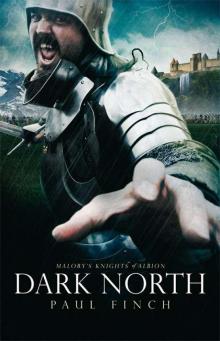 Dark North mkoa-3
Dark North mkoa-3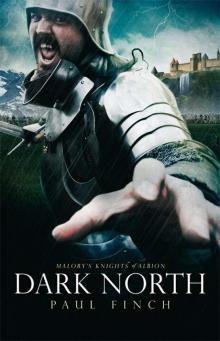 Dark North (Malory's Knights of Albion)
Dark North (Malory's Knights of Albion)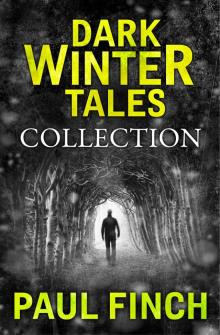 a collection of horror short stories
a collection of horror short stories Sacrifice
Sacrifice Kiss of Death
Kiss of Death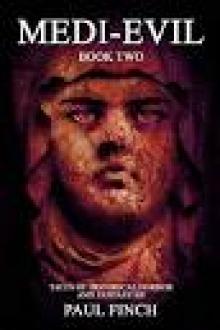 Medi-Evil 2
Medi-Evil 2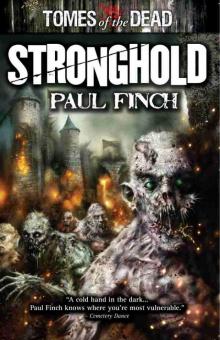 Stronghold
Stronghold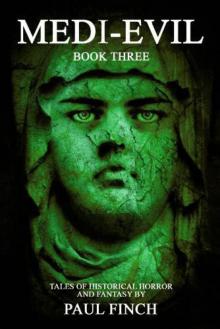 Medi-Evil 3
Medi-Evil 3 Dead Man Walking
Dead Man Walking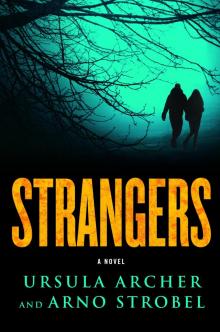 Strangers
Strangers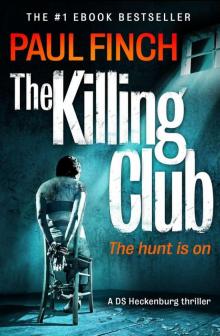 The Killing Club
The Killing Club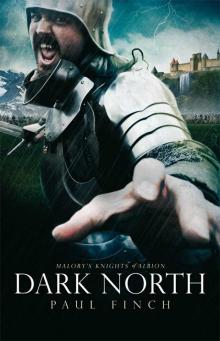 Dark North
Dark North A Wanted Man
A Wanted Man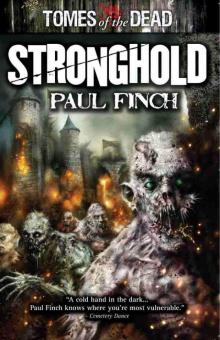 Stronghold (tomes of the dead)
Stronghold (tomes of the dead) Hunted
Hunted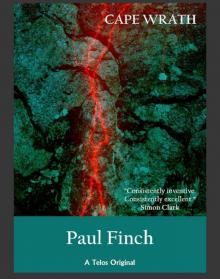 Cape Wrath
Cape Wrath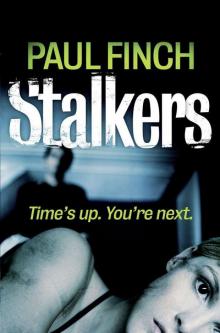 Stalkers
Stalkers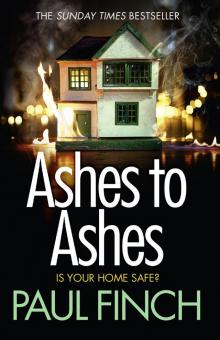 The Burning Man
The Burning Man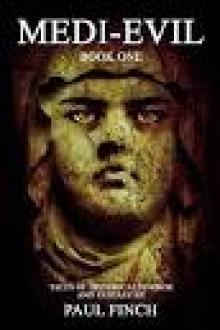 Medi-Evil 1
Medi-Evil 1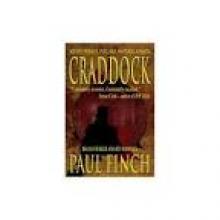 Craddock
Craddock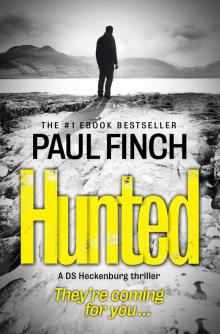 Hunted (Detective Mark Heckenburg Book 5)
Hunted (Detective Mark Heckenburg Book 5)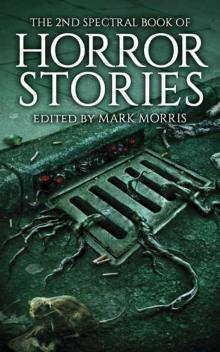 2nd Spectral Book of Horror Stories
2nd Spectral Book of Horror Stories The Chase
The Chase